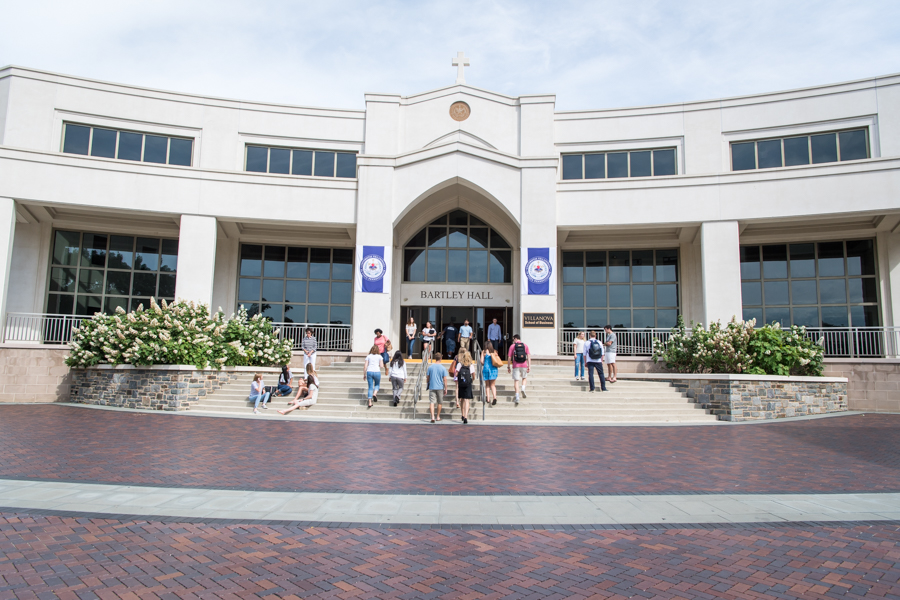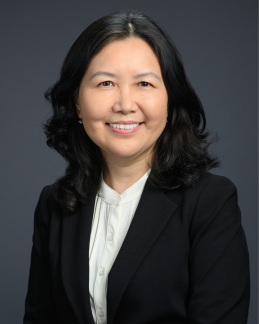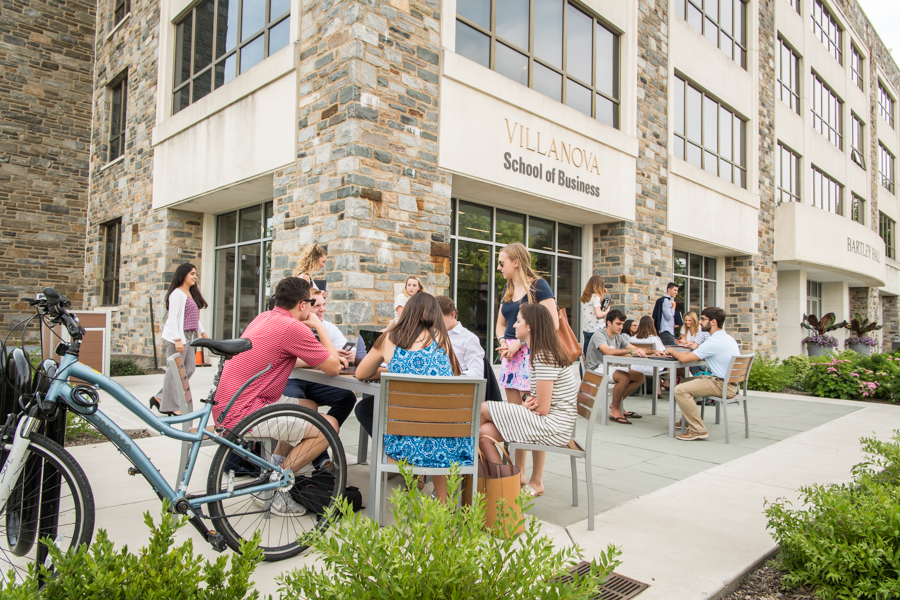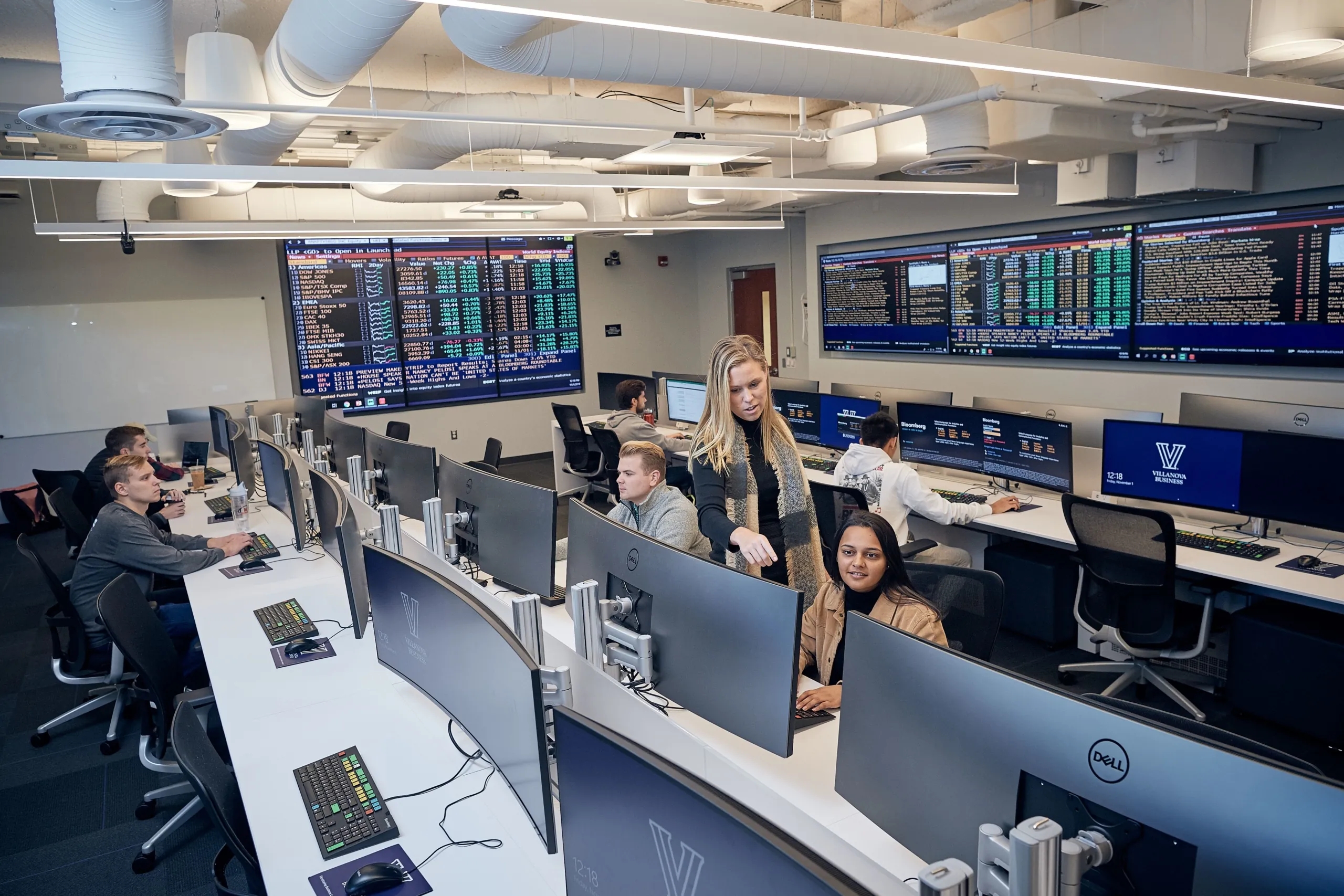
Bartley Hall is home to Villanova School of Business. Courtesy photo
Since becoming dean of Villanova School of Business last August, Wen Mao likes to joke that it’s the only job left that would allow her to stay at the school she joined 29 years ago.
She started as an assistant professor in economics at VSB in 1995, and rose through leadership serving as chair of the Economics Department, Associate Dean of Faculty, Vice Dean, and now the Helen and William O’Toole Dean. She’s served on numerous committees for both the business school and the university. She helped recruit and retain dozens of faculty, championed efforts to increase funding research while promoting the school’s teacher-scholar model, and helped establish VSB’s first study abroad program in Asia.
“People say you need to move up in your career, and over the years, people move to a better position or place. I did that without moving because Villanova kept moving me up,” Mao tells Poets&Quants.
“It’s a privilege and honor to be here for 29 years, witnessing the takeoff of this place from a regional teaching school. I always say they wouldn’t take me now, as a faculty member or a student. They let me in 29 years ago, but I’m not sure I could make the cut now.”

Wen Mao, dean Villanova School of Business
A B-SCHOOL ON THE RISE
Over nearly three decades, Mao has watched her beloved VSB grow in both size and stature.
In 2013, the b-school secured a $50 million gift from alumnus James C. Davis, the largest ever for Villanova University at the time. It led to several other multi-million dollar gifts from alumni and supporters that have helped transform VSB into a national target school.
The undergraduate program now enrolls about 1,700 students. It reported a 99.7% employment rate for its Class of 2023 graduates in our 2024 ranking of undergrad business programs, a rise of 2.98% over the year before. VSB came in at No. 12 out of 91 top business schools in that ranking, rising two spots from the year before. In 2017, VSB redesigned its honors program to give undergrads the chance to participate in faculty research. Nearly 100 undergrads have been placed as research assistants since and several of them have co-authored research papers published in peer-review journals, a rarity for undergrad business students.
Its graduate and executive programs enroll about 1,000 students, including a refashioned professional MBA program that allows students to take classes online, on campus, or both in as little as 18 months. That program ranked No. 26 in our 2024 ranking of online MBAs. VSB also established the first Center for Church Management at a business school and it created a Master of Science in Church Management in 2022.
VSB has added centers in commercial real estate, global leadership, professional development, multiple new degree programs, and a new center for financial markets including the opening of the Gmelich Lab just before the pandemic. Today, the school’s alumni network is more than 32,000.
Almost a year into her first term as dean, Mao is leading VSB into an era of unprecedented change. It’s created new programs focused on AI and Machine Learning, while incorporating the latest tools and trends into its core content. In October, Villanova University will launch the most ambitious capital campaign in its history. For its part, the business school plans to double its number of endowed faculty while pledging $20 million for new need-based scholarships.
Poets&Quants recently caught up with Mao to talk about her long career at VSB as well as what comes next. Our conversation has been edited for length and clarity.
Tell us about your professional background and your journey through the ranks of Villanova School of Business.
I was born and raised in China, and I came over for my PhD in economics. I graduated from Virginia Tech in ’94, and then I started almost immediately here as an Assistant Professor in the Economics Department. It was an instant and permanent love from day one. For whatever reason, it just felt like home.
I made tenure, then became department chair. After that, I did the associate job for a while, and more recently, became the Vice Dean.
Initially, I couldn’t explain it, but later I realized what drew me to this place. It felt familiar and friendly. People are very kind. That sense of community and shared values is what makes this place special. It makes it very easy to work here because people truly believe in what we do.

Villanova School of Business undergrad students on a trip through the Daniel M. DiLella Center for Real Estate. Courtesy photo
What are some of the achievements or milestones during your time at VSB that you’re really proud of?
There are quite a few. I think the Economics Department itself has grown just like all departments in the business school. We have grown and evolved, and we have made tremendous hires over the years. The biggest thing I’m proud of is how incredibly supportive people are of one another. Any achievement by anyone is celebrated, and people are genuinely happy for each other. Because of that, we have nurtured many young colleagues to success and have seen them develop their careers here, just as we did when we were junior faculty members. We protect our junior faculty members very fiercely.
While we have elevated research significantly in recent years, we never lost sight of our students. We remain extremely committed to putting students first. Students have always been, and always will be, at the center of what we do. That commitment to our students is something I find tremendous. We never lose sight of who we are.
What was it about being dean that appealed to you?
I think it’s about telling our story. Initially, I didn’t appreciate that. When you’re on the operations side, you know every nook and cranny of this place. You know exactly what we need, what we’re good at, and what extra funding would do for us. You think, “Now I’m in a position to fundraise and do these things,” and that’s exciting.
I’ve really been getting to know our alumni, and they are special and so passionate. You never truly know them until you’re the dean, going around the country and meeting them.
Recently, I was in New York for the first-ever Women in Finance event. It’s a typical Villanova story: we asked five very busy, successful businesswomen in New York to participate, and we got 100% “yes.” They lingered, spent time talking to undergraduate students. The overwhelming question was, “What more can we do?” and that makes this job so much easier and rewarding.
I guess you didn’t really have to spend the first months getting to know the school since you know it pretty well after almost three decades. So what are the big things you’ve been working on, and what are some of the big goals for your tenure?
In a nutshell, because we’re Catholic, I’m going to quote St. Francis de Sales: “Be who you are and be that well.” That’s the guiding force for what we’re going to be doing in the next few years.
We remain committed to our students while evolving. But, we have to evolve to stay the course because so much has changed in this industry. There is unprecedented policy uncertainty, demographic challenges, and technological disruption that impacts not only what we teach but also how we teach. So there’s a lot of change, and you have to keep evolving while staying focused on who we are and doing that well.
Even though I’ve been here for decades, I promised myself never to assume I know everything. I spent my first year on a listening tour, holding focus groups and open forums with various groups of faculty, staff, and students, and being open to feedback from a new vantage point. This confirmed a lot of what we already knew but was also refreshing to hear what people think the future should be for Villanova.
Meeting our alumni around the country has been very rewarding. As a teacher, you always wonder how your former students are doing. This job allows me to see many of my past students, and it’s incredible to see them doing well and willing to give back to the university.
Now we’re moving forward on a few initiatives. In October this year, we’re launching the most ambitious capital campaign in the university’s history. For the Villanova School of Business, we have three main goals. First, we aim to double the endowed faculty positions to attract and retain top talent, because talent is so important. Villanova has elevated so much that we are now competing with schools we never thought we would 20 years ago.
Second, we want to ensure we meet 100% of demonstrated financial needs for students. VSB’s pledge is to raise $20 million in new scholarships. That will be tremendous is getting a diverse student population and making us even more competitive. This year, we had a record low acceptance rate of 17.5% for the School of Business.
Lastly, we have the Dean’s Fund for Strategic Initiatives, our incubator and R&D fund, allowing us to try new things, experiment, and invest in new ideas. For example, the O’Donnell Center and the Clay Center started in the incubator, and it worked so well, it was an idea we funded. We need funding to continue trying new things, some of which will succeed and some won’t.

Students congregate outside the Villanova School of Business. Courtesy photo
Those scholarships you mentioned seem related to some of the demographic challenges coming for higher education, particularly at the undergraduate level. Is that what you’re talking about?
Yes. Students demonstrate financial need through the federal program based on their family’s income and savings. We then determine how much they are short compared to the tuition. Some of the top universities already meet 100% of demonstrated financial needs, meaning if you demonstrate the need, you will get a scholarship to cover it. Villanova is currently at 85%, so to close that 15% gap is one of the top priorities of the university in this campaign. The School of Business is pledging to support this initiative with a $20 million new scholarship fund. Our goal is to completely close that gap by 2030.
In other words, any student who is accepted will be able to attend without financial barriers.
We’ve written a lot at Poets&Quants about AI, sustainability, and other topics students are now looking for in their business degrees. What are you doing in these areas?
That’s a good question. For AI, which is everywhere right now, we have an AI and ML (machine learning) minor at the undergraduate level and an AI/ML concentration at the graduate MBA level.
The key is that AI is moving so fast. The curriculum needs to be very agile. A very systematic course or major design isn’t quick enough, in my opinion. A decentralized approach is more effective, allowing faculty to bring in those materials into their classrooms. This works well for a school like ours because our faculty are very committed to their teaching mission and constantly updating their courses. Allowing them the flexibility to incorporate new developments in AI is the quickest way to keep up with the pace of change.
We need to create a mentality among faculty and students to embrace change. We say, “Change is your default setting.” It’s not just about teaching them the newest things but preparing them to expect that whatever they’re learning now will change in a few months. We need to teach them to teach themselves and embrace change rather than fear it. Our approach is to instill in students the ability to adapt, learn independently, and be excited about new developments.
Quality has always been our focus, and that individualized approach to educate the whole person lends itself well in this kind of environment.
While we have minors for students who want to dive deep, about 90% of jobs need a basic level of understanding in AI, rather than expertise. That’s what we’re trying to prepare them for. We’re preparing students to understand the tools, their purposes, potential biases, and how to integrate these tools into their careers.
Let’s go more specific for each level: undergrad, MBA, and Executive Education. Are there any recent innovations or new initiatives in those programs that you can point to?
For undergraduates, we don’t have new degrees, but we have a very successful concentration in our finance major called Applied Quantitative Finance (AQF). This program is very quant-focused, requiring students to take computer science, advanced mathematics, statistics, and economics courses in addition to finance. It’s been very successful in producing top-notch students who secure top Wall Street jobs. This program is a result of our constant engagement with the industry and feedback from alumni who are very passionate and involved.
We’re also leveraging the Gmelich Finance Lab, which we built a few years ago, with Bloomberg terminals and data that students use quite a bit. The AI and machine learning minor I mentioned earlier is another significant innovation.

The Gmelich Lab for Financial Markets features 28 workstations connected to large, complex platforms used in financial analysis. Photo credit: Villanova School of Business
On the professional development side, our mentors program has been very successful. We pair recent, and sometimes not-so-recent, graduates with sophomore undergraduate students for mentorship. This program has a lot of alumni involvement, and it has been working great. Many of the former mentees are now mentors in the program.
We also have a very successful advising model through the Clay Center and O’Donnell Center. This model is one of our differentiators, preparing students beyond classroom skills with job search, resume writing, and interview skills. We are considering adding a coaching element. Traditionally reserved for executives, we believe coaching is essential for today’s undergraduates to build resilience and navigate life. This initiative is still in the planning stages, and we are actively fundraising for it as it will require significant resources.
I think this will be tremendously helpful for the new types of students we’re getting. I don’t have to push them to study anymore; they’re high achievers. The question is, how do we build them to be stronger and more resilient, well-rounded individuals? We focus on developing their communication and interpersonal skills, which will be even more essential with AI taking over many tasks.
What about at the graduate or executive level?
I think the market is trending more towards certificates and stackables because people have limited time and want quick learning opportunities as opposed to the traditional degree. We’re testing some AI and machine learning certificate programs that are more industry or company-specific. So far, they’ve been well received, but this space is moving very quickly, so we need to be agile and nimble.
We’re not a big school, and sometimes with online learning, volume is key. We’re never going to be a volume player, we’re always going to be a quality player. However, scaling online programs is important, and we need to be nimble to match our strengths with the right market demand in this fast-moving environment.
I read an article recently about how the number of women deans has increased significantly over the last several years, but it’s still around 30%. Do you think this is still an important issue, and if so, why do you think representation in a role like dean still matters?
I think it does matter and always will. If you’re the only person of a certain gender in the room, you notice it, and others do too. Society is a bit past that; it’s less about being the first and more about how you feel in that room and the level of respect you can command. We’re getting more subtle in terms of gender parity. We’ve definitely come a long way, but it’s not over. Interestingly, at Villanova, other than the law school dean, all deans are female.
It’s good that we talk about it sometimes, but it’s not front and center. I think that’s a good thing. In the business school, even though we admit students at a 50-50 ratio, the final student body ends up being more male. It’s about 60% male and a little over 40% female. I’m personally less concerned about the exact number and more about how female students feel when they’re here. That’s harder to assess and work on, but very important.
For example, when we built the finance lab, and at first it was mostly boys using it. Female students felt intimidated despite being just as capable. To address this, we incorporated lab sessions into the mandatory macroeconomics classes, making the lab more inclusive. Now, more female students use the lab. Our finance department insisted on having a 50-50 ratio of student workers in the lab, which has also helped. We’re better now, though not 100% there.
Anything else you’d like to add?
What I’d like to emphasize is our values. We are a school that builds on our common values: Veritas, Unitas, and Caritas—truth, unity, and love. Many schools have similar values, but we truly live these every day. I’ve never been to a meeting where these aren’t discussed. People here feel they can be honest. We’re always restless in the sense that when people question things, no one questions their motives. This allows us to be honest about things, which has kept us going and moved us up. Our values are really important to our success.
Another key aspect is our strong sense of community. Visiting students always notice the door holding here, even when someone is a few steps away. People go out of their way to help, which is part of our DNA. Our faculty always make time for students. They are never too busy with publishing or research to help. This community spirit helps produce outstanding students.
The best story I heard on the road was when I asked a student why they chose Villanova. He told me that his neighbor is a Villanova couple, they’re the nicest people, and he wanted to go to the university where they went. Stories like that, about who we are, have carried us very far.
Finally, we treat people well, which keeps our turnover rate low. For example, during the pandemic, when our school and so many others closed, Villanova University did not lay off any custodial workers or support staff. They were paid the whole time, and leadership took pay cuts to ensure we could do that. These are examples of things we do that make us special.
Don’t miss: The Student-Led Fund That Turns Undergrads Into Real Estate Investors and The P&Q Interview: A Strengths-Based Approach To Employability At This UK B-School










